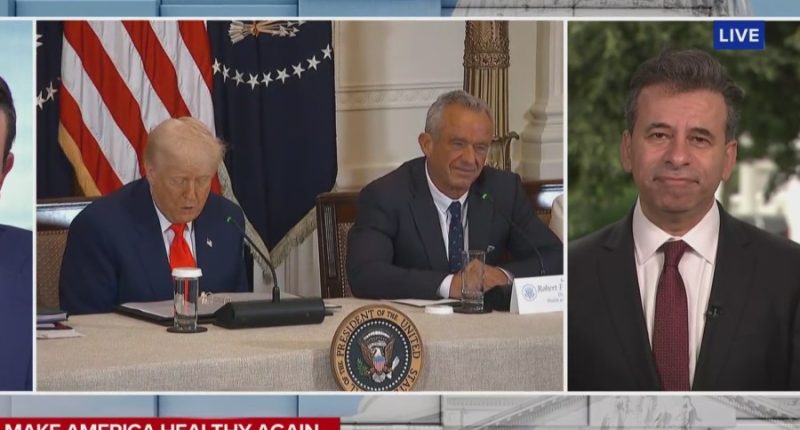Share this @internewscast.com

() FDA Commissioner Dr. Marty Makary said Thursday that the United States needs to transform its health care approach from treating disease to preventing it, as the Trump administration unveiled a sweeping “Make America Healthy Again” report calling American children the “sickest generation.”
“Our entire focus of the U.S. health care system has been on the back end. It’s been a reactionary system, and we need to be proactive and look at the root causes,” Makary told “The Hill on ” after the report’s release.
The 69-page report, containing more than 500 citations, paints a stark picture of American children’s health. Makary cited alarming statistics: 40% of children have chronic conditions, one in 14 boys takes ADHD medication, and one in 14 girls receives depression treatment.
The report attributes the health crisis to ultra-processed foods, which comprise 70% of children’s calories and are linked to obesity, ADHD and depression. It also blames chemical exposure, overmedication, lack of exercise and corporate influence for rising chronic illnesses.
“We’ve got a major crisis now with children. We’ve got a major chronic disease epidemic,” Makary said, describing the situation as uniquely American. “This chronic disease epidemic doesn’t exist in other parts of the world. This is an American problem.”
Health and Human Services Secretary Robert F. Kennedy Jr., who spearheaded the initiative, called it unprecedented.
“Never in American history has the federal government taken a position on public health like this,” Kennedy said at the unveiling.
The report lacks legal force but will guide policy development over the next three months.
Makary outlined concrete changes ahead: increased NIH research into root causes of disease, Medicare payment restructuring to incentivize health rather than just treat sickness and expanded FDA focus on food safety alongside drug regulation.
President Donald Trump announced plans to phase out eight common artificial food dyes, calling them petroleum-based additives. Makary said food manufacturers are already cooperating, seeking “a level playing field” as 30 states consider or have passed food dye restrictions.
The commissioner said the initiative transcends politics: “Can we love our nation’s children more than we hate each other politically? This is a call to unite around medical science and look at root causes.”
Rather than treating childhood obesity solely with medications such as Ozempic, Makary suggested addressing school lunch programs. Instead of focusing only on chemotherapy for rising youth cancer rates, he advocated examining environmental chemical exposures.
The report calls for increased scrutiny of childhood vaccine schedules, pesticide reviews and addressing what it describes as overmedicated, undernourished children. Kennedy refused to identify the report’s authors.
Makary positioned the effort as delivering on campaign promises, noting that parents across party lines supported Trump partly due to the MAHA agenda. The approach represents “an entirely new framework” for the administration’s health policies.
The Associated Press contributed to the report.











